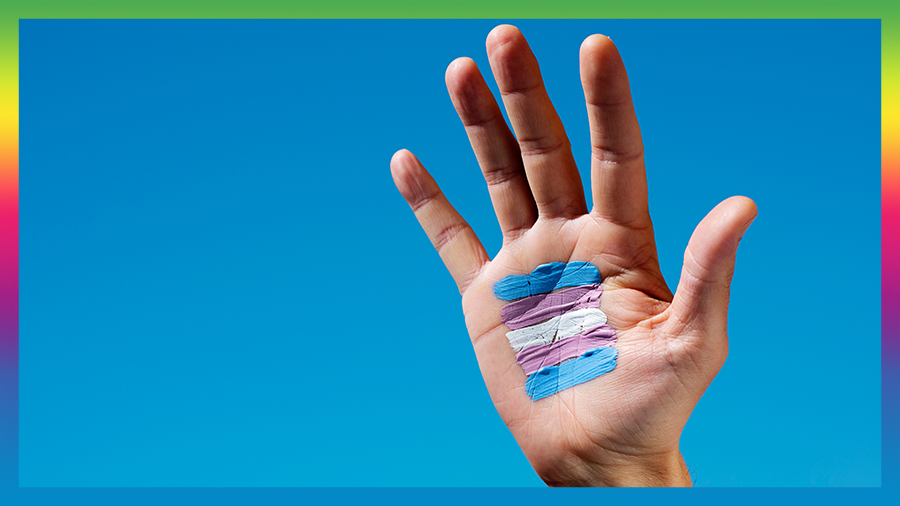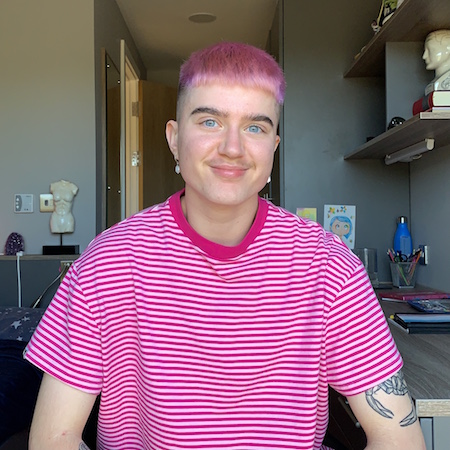
05 Sep Layton’s story: I was really drunk when I came out at as trans. I texted my family in the WhatsApp chat
Hey – thanks for having us on your screen. Welcome to the Back on Track Teens blog for young people and those young at heart.
You’ve loaded a blog article that’s part of a mini-series about gender and sexual identity*. The mini-series shares 11 wonderful and inspiring stories from young people who identify as LGBTQ+. Feel free to read on but you may want to pause and have a quick scan of the opening article to give a bit of context around the collection of stories and resources available. Please click here to read the first article.
“I was going to be changing into somebody maybe they didn’t know … I wanted to make them aware” – Layton
This blog article continues the gender and sexual identity mini-series with trans man, Layton’s story. It is an honest, moving account of the challenges Layton has faced throughout his journey of identifying as bisexual, then later as a lesbian, and finally coming out as trans.

Layton’s story
Name: Layton
Age: 22
Pronouns: He/they/them
Identifies as a trans man
Occupation: Postgraduate student
“I started hormones…I think that was something that people around me needed to understand that I was going to be changing and I didn’t want them to draw attention to anything that I might be insecure about. When it’s just to do with your sexuality that is a lot more openly embraced by society as a more normal thing these days…but being trans is separate from that
Obviously, my name changed as well and I understand completely that might be difficult for people around me, especially those who raised me and have known me my entire life. You should only ever [come out] if you’re ready, if you’re in the right headspace, if you know that it’s the right thing for you…because I was going to be changing into somebody maybe they didn’t know, and I just wanted to make them aware of that.”
What was it like to ‘come out’?
Layton grew up in a very conservative area and attended a private school that was predominantly white with little to no diversity (that Layton was aware of). Layton’s parents were conservative and his two sisters adopted a similar mindset and behaviour as them.
“I came out at 16 as bisexual and they didn’t understand anything about the LGBT community. It gradually got better and they started to understand why does it matter who I want to love and be with?
I was really drunk when I came out at as trans. I texted my family in the WhatsApp chat. They were all very supportive the night I did that but as soon as I started saying that I wanted to change my name and other things about me were going to change everything went downhill.
They thought I just wanted to wear masculine clothing and have my hair short. As soon as it became real that I was changing it became awful. Mum only started speaking to me a few weeks ago and deadnames me on purpose. My dad hasn’t been great [but we] had a very open conversation … I can tell he’s now making an effort.”
Layton’s experience in coming out to his family has been far from ideal. His younger sister has been transphobic towards him and only recently has his relationship with his mum started to normalise, although there is still much progress to be made.
Layton’s step-grandma, however, has been amazing, encouraging and supporting him in his journey.
“I couldn’t have done it without friends around me, especially my girlfriend. I don’t think I would be here today without her. If you’re changing, you are still you. The only thing that has changed about me is how comfortable and confident I feel. A year ago I wouldn’t have appeared on camera. The anxiety around that was massive.”
Going through a gender change
There are different ways to undergo hormone replacement therapy to address gender dysphoria or as part of gender-affirming hormone therapy. It’s not a subject we will go into in detail within this article, however, the NHS and Mayo Clinic have useful information to refer to.
Layton is currently undergoing a gel hormone treatment that started in February 2021 at a private clinic. This was after finding waiting lists for trans consultations on the NHS, in his experience, to be five years long.
“I started testosterone on February 19 this year and every day since then I feel like my voice is becoming my own. My face is becoming my own. My body is becoming my own. My soul is becoming my own and I think the confidence that comes with that really resonates and so I’m very happy to be here, but I’m super proud of myself for being here speaking to you as well because that is completely different to who I was a year ago.”
Looking retrospectively, Layton says the change happened quicker than it felt at the time. He noticed his genitals becoming larger and experienced a huge boost in sex drive. After about three months he grew his first fuzzy moustache, sweats a lot more and says his pubic hair growth is ‘ridiculous’.
Layton explains his experience over the past few months aged 22 as what a cismale would go through at around the age of 14 years old.
Discussing stereotypes and homophobia
The process of gender reassignment therapy will be different from person to person. A trans man or trans woman going through therapy may be subject to being misgendered – where other people refer to them as the wrong gender or use incorrect pronouns.
Layton still gets called a lady around five times a week. He explains that it makes him feel invalidated but for him personally, because he’s used to it and comfortable in his newfound identity, he can brush it off and not let remarks affect him.
“It will depend on what I’m wearing or how I brush my eyebrows. Things like this make you realise how gendered society is. If you want to correct them, correct them, but you don’t need to. People slip up, apologise, correct and move on. As long as you are happy in your own skin that’s all that matters.”
Layton raises a valid point around how gendered society is. When you think about it, assumptions about gender are being made even before babies are born. Parents, families and friends choose décor, clothes and gifts – pink for girls and blue for boys. This gender binary is reinforced in many situations during education and activities where classes are split into girls and boys, and children often don’t play sports together.
From Layton’s point of view, the increased awareness of and opportunities to use different pronouns is a step in the right direction. However, he believes that there is still a lot of unlearning to do in terms of harmful, restrictive modes of binary thinking.
What resources are out there to help people learn more?
Layton uses Instagram to find information and connect with the trans community. In his experience, he didn’t meet another openly LGBTQ+ person until going to university. Finding that one person who has been through what you are experiencing can be a powerful tonic to feeling alone.
“[They] have the ability to make you feel loved and right even if the whole other world wants to put you down. Knowing that you’re not alone and you’re not the only person. Schuyler Bailar is a trans swimmer and puts up so many informative posts. I felt like what he was saying about himself and his experiences, ‘OMG it’s like me’. While social media has its flaws, you can connect to people and find accounts that make you feel validated for who you are.”
Layton says Reddit is a good resource for trans information. The information platform publishes open and honest conversations about the trans experience, such as what would happen if someone chose start hormones.
Researching online and using social media comes down to what you choose to pay attention to and how you curate your feed. Layton recommends finding people, organisations and resources that can uplift you, educate you and open you up to new perspectives.
What advice would Layton offer to parents?
“The biggest one is let your kid explore it, don’t put any pressure on them and don’t approach the subject until you think they are comfortable, or they’ve tried to approach you. Parents need to understand that your baby, your kid, are perfect for who they are. Being part of the LGBTQ+ community does not change who they are and accepting them and loving them is beautiful. I promise you that they will flourish as people if you give them unconditional love.
I think it’s so sad that we should give advice to parents because some might reject [their kids] and it’s something I say from experience coz my parents have done it, exactly that.
Just know your kid is perfect and incredible and beautiful for exactly who they are. They will be happier, and they will be themselves, being part of the LGBT community is not different, is nothing to be afraid of, it’s just a beautiful human differentiation and you should embrace it. I think you will find that if your child is part of the community, they naturally will be so much more resilient than other people.”
Layton feels strongly that the way to reduce uncertainty of and prejudice toward the LGBTQ+ community is to increase representation, visibility and understanding. He believes that you don’t have to understand everything to respect and support people and make them feel comfortable.
“Stick with the people who support you. There will always be people who will be routing for you to be your most authentic self. You do not need to prove anything to anyone apart from yourself. My DMs are always open.”
How can sex education be improved in schools?
Lack of sex education in schools, particularly any sex education relating to LGBTQ+ identities and experience, has been an issue highlighted by all our interviewees.
Accessibility to online channels alongside mainstream media makes it easy for very young people to be exposed to or seek out sexual activity; far younger than the age at which sex education is delivered in schools. As Layton emphasises himself, education systems should be teaching young people about the mental health side of safe sex, the importance consent and the dynamics of romantic and/or sexual relationships. This should be taught in addition to the science of heterosexual procreation and the reproductive system.
“I think I saw a quote for it once and it said, ‘I was taught about World War Two in school but it’s not made me want to invade Poland’ – I feel like I can say that because I’m Polish but yeah, that’s how it works. I think trans education in school would be such a beautiful thing even if it was just touched upon for 10 minutes – 10 minutes of those kids’ time and that has the power to normalise in a child’s head when they’re growing up like ‘hey, I feel different but it’s OK’.”
As far as representation of being transgender in mainstream media goes, Layton says that, in his experience, transfem representation is a lot more out prevalent than transmasc, so there’s still work to be done. He does reference a recent Starbucks advert, part of their #Whatsyourname campaign, which features a young transgender man.
While he’d like to see more of the transmasc experience on our TV screens, Layton mentions that the TV series POSE is a great series to watch because it tells the story of a number of trans women (all of whom are played by actors who are trans women themselves).
What advice would Layton give to their younger self if they got the chance?
“Stop caring what other people think. The only opinion that matters is your own. You’re gonna fall down a few times but you will get to the top eventually and the way you get to the top is through loving yourself and affirming things yourself.” Layton
Listen to Layton's story
Choose the life you want to lead
Everyone has a different timeline when exploring their identity and it is an individual journey. If you have enjoyed reading this blog post, feel free to read more stories from incredible young people and share the series with your friends and family.
Find the full podcast series here, the blog article series here and connect with us on social below:
Everyone has a journey to experience and a story to share. Learn more, increase your knowledge and find your community to live a more fulfilling and happier life. Everyone is unique and deserves to feel comfortable and accepted in how they identify.
“The only queer people are those who don’t love anybody.” Rita Mae Brown
Thanks for reading…
Creating the gender and sexual identity mini-series has been an incredible experience for the Back on Track Teens team.
- I encourage you to go ahead and download our free eBook, which brings the interviews together with a huge collection of information, resources and inspiration.
- Subscribe to the Spark to Your Success podcast here.
- Access insightful stories, helpful exercises and more resources on our blog.
- Refer to the Back on Track Teens LGBTQ+ glossary here.
- Order ‘The Spark to Your Success – Helping Teens Build Resilience here.
- Order ‘The Spark to Your Success – Mindset Magic for Teens’ here.
Are you a parent or caregiver of a young person who may be experiencing challenges around gender or sexual identity? Book a session with TeeJay Dowe
Work at a school or organisation and want to know more? Book an awareness training session
*The blog articles capture real stories and the topic of conversation is frank. Its purpose is to elevate the voices of people within the LGBTQ+ community, answer questions, provide resources, and offer support.


No Comments